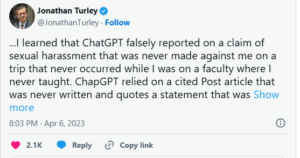Mark Walters, a law professor at the University of Washington, has raised concerns after discovering that ChatGPT falsely accused him of sexual harassment. Walters revealed that when asked about him, the chatbot generated a fabricated narrative claiming he had been involved in harassment incidents.

Walters stated he was “shocked and outraged” because the information was completely false and damaging to his reputation. He emphasized that he had never faced any such accusations in his career and warned that this type of misinformation could seriously harm individuals’ professional and personal lives.
This incident has reignited debates about the accuracy, accountability, and potential risks of AI-generated content. Experts highlight that while ChatGPT and similar tools can provide useful information, they may also generate hallucinations—false or misleading claims that appear convincingly real.

Walters is reportedly considering legal action, citing defamation and reputational damage, while also calling for stricter regulations to ensure that AI companies take responsibility for the accuracy of their systems.